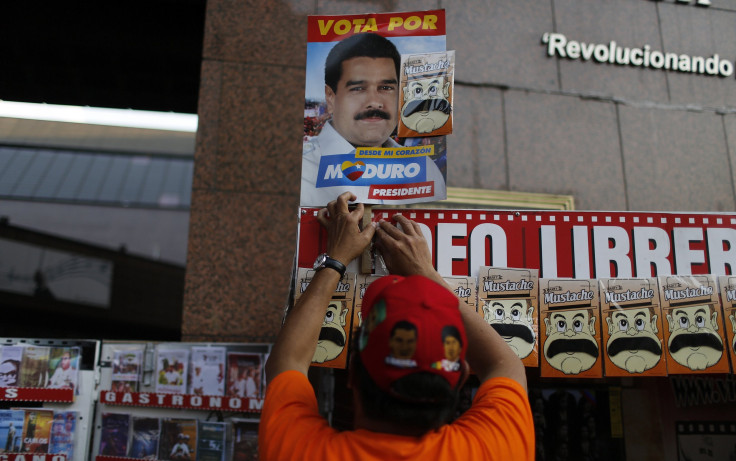Nicolas Maduro: A Moustache Revolution In Venezuela?

Nicolas Maduro, the new (and, to some, disputed) president of Venezuela, is expected to follow the socialist welfare policies of his illustrious mentor and predecessor, the late Hugo Chavez.
But Maduro, who comes from humble origins and once worked in the very proletariat job of bus driver, differs in at least one way from Chavez and most other Venezuelan leaders from the past six decades or so: He wears a moustache.
Not just any moustache, but a big bushy black one that has become a kind of trademark for the new ruler of Caracas -- in stark contrast to his clean-shaven opponent, Henrique Capriles (who has vociferously challenged this week's election results).
During the raucous presidential campaign in Venezuela, some of Maduro’s supporters (presumably all inherited from Chavez) proudly wore fake moustaches to express their solidarity with him.
Roman Schuello, who sells fake moustaches on the streets of Caracas, told Vice.com: “It’s the new fashion. I’m selling loads [of moustaches]. I’ll sell even more over the next few days.”
Oswaldo Ramirez, a young man who purchased a moustache from Schuello, explained: “The moustache is a symbol of Maduro!”
Indeed, some Maduro supporters even ran a Facebook page entitled "Moustaches of my Fatherland," which showed photos of hundreds of people, including women, with moustaches either stuck on or photoshopped in.
While a moustache will have no influence on Maduro’s political activities and government policies, his choice of facial hair may signal a change in Venezuelan politics.
Assuming Maduro stays in the presidential palace, he will become the first Venezuelan leader with a moustache since Luis Herrera Campins, who served from 1979 to 1984 (at least based on their official presidential portraits).
Prior to Campins, you have to go all the way back to the 1930s to find a similarly mustachioed boss in Caracas: Eleazar López Contreras, who sported a rather, trim conservative one.
But for Maduro, it doesn’t look like he will shave his now-famous moustache anytime soon.
George Ciccariello-Maher, the author of “We Created Chávez: A People's History of the Venezuelan Revolution,” said that political movements and revolutions in particular have powerful echoes in popular culture and personal style.
For example, he noted, the Cuban "barbudos," the bearded revolutionaries under Fidel Castro, led to a wave of popularity for beards, and a necessity of the struggle (i.e., the inability to shave) became a “style.”
“Maduro's mustache was indeed a central symbol in the election, and even something of an Internet meme,” said Ciccariello-Maher, who is also an assistant professor of history and politics at Drexel University in Philadelphia.
“Videos were [broadcast] in which those making revolutionary arguments suddenly grew mustaches and many a Venezuelan photoshopped a mustache onto their own picture. Time will tell, however, if this is a long-term question, and Maduro's unexpectedly low showing in the election may doom the mustache again to oblivion.”
Indeed, the Cuban Communist revolution of Castro was closely identified with his moustache, beard (and, of course, Havana cigar), as well as the facial follicles of Marxist icon Che Guevara.
But the "commandante" of Venezuela’s socialist revolution, Hugo Chavez, sported no facial hair whatsoever.
Miguel Tinker-Salas, professor of Latin America history at Pomona College in Claremont, Calif., noted that Chavez came from a professional military background, a tradition that eschewed mustaches and facial hair.
“Beards and mustaches have been more associated with those traditionally opposed to the government in power,” he said, citing Cuba’s Camilo Cienfuegos, as well as Che and Fidel, and the guerrillas that challenged authority during the 1960s.
In contrast, Tinker-Salas pointed out, Venezuela's ruling elite strove to emulate their U.S. and European counterparts, largely abandoning facial hair and opting for more advanced “Western” notions of fashion.
During the 20th century, the likes of mass murderers Joseph Stalin, Adolf Hitler and Saddam Hussein gave moustaches a very bad name in the Western world.
Indeed, among the current male heads of state of Western Europe and North America, not a single leader wears a moustache, somewhat mimicking the styles of corporations, as well as reflecting a dramatic change in fashions over the past century. If, say, Barack Obama or David Cameron suddenly stopped shaving, it would become the biggest news story on the planet for a few weeks.
Moreover, a quick glance at current male leaders in other South American nations reveals only two other heads of state besides Maduro with moustaches: Federico Franco, the president of Paraguay, and José Mujica, the president of Uruguay.
So much for the notion of “macho Latins.”
Manuel Gomez, a professor of law at Florida International University, notes that while the current president of Mexico, Enrique Peña Nieto, is also clean-shaven, a number of his predecessors, including Vicente Fox and Carlos Salinas de Gortari, wore moustaches. Fox, in fact, seemed to epitomize the classic dashing mustachioed "Latin look.”
But those days may be long gone.
On the whole, male leaders of modern states appear to have rejected facial hair as something unappealing or even uncouth.
Indeed, the last mustachioed American president (while occupying the office) was William Howard Taft, a Republican whose term in Washington ran from 1909-1913.
Looking at the major democracies of Europe, the last British prime minister to sport a moustache was Harold MacMillan, whose term in office ended in 1963. Across the English Channel, the last French president to wear a moustache was the iconic general and statesman Charles de Gaulle, whose term ended in 1969.
As for Maduro, we have to wonder, given the current turmoil in postelection Venezuela, whether he'll end up making moustaches popular again, or push the custom into the waste bin of history.
© Copyright IBTimes 2024. All rights reserved.




















